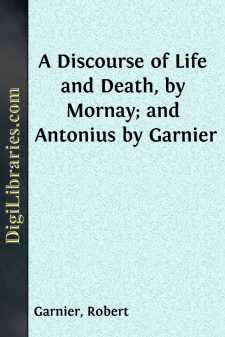Categories
- Antiques & Collectibles 13
- Architecture 36
- Art 48
- Bibles 22
- Biography & Autobiography 813
- Body, Mind & Spirit 141
- Business & Economics 28
- Children's Books 12
- Children's Fiction 9
- Computers 4
- Cooking 94
- Crafts & Hobbies 4
- Drama 346
- Education 46
- Family & Relationships 57
- Fiction 11826
- Games 19
- Gardening 17
- Health & Fitness 34
- History 1377
- House & Home 1
- Humor 147
- Juvenile Fiction 1873
- Juvenile Nonfiction 202
- Language Arts & Disciplines 88
- Law 16
- Literary Collections 686
- Literary Criticism 179
- Mathematics 13
- Medical 41
- Music 40
- Nature 179
- Non-Classifiable 1768
- Performing Arts 7
- Periodicals 1453
- Philosophy 64
- Photography 2
- Poetry 896
- Political Science 203
- Psychology 42
- Reference 154
- Religion 513
- Science 126
- Self-Help 83
- Social Science 81
- Sports & Recreation 34
- Study Aids 3
- Technology & Engineering 59
- Transportation 23
- Travel 463
- True Crime 29
A Discourse of Life and Death, by Mornay; and Antonius by Garnier
by: Robert Garnier
Description:
Excerpt
Sieur du Pleßis Marly.
T seemes to mee strange, and a thing much to be marueiled, that the laborer to repose himselfe hasteneth as it were the course of the Sunne: that the Mariner rowes with all force to attayne the porte, and with a ioyfull crye salutes the descryed land: that the traueiler is neuer quiet nor content till he be at the ende of his voyage: and that wee in the meane while tied in this world to a perpetuall taske, tossed with continuall tempest, tyred with a rough and combersome way, cannot yet see the ende of our labour but with griefe, nor behold our porte but with teares, nor approch our home and quiet abode but with horrour and trembling. This life is but a Penelopes web, wherein we are alwayes doing and vndoing: a sea open to all windes, which sometime within, sometime without neuer cease to torment vs: a weary iorney through extreame heates, and coldes, ouer high mountaynes, steepe rockes, and theeuish deserts. And so we terme it in weauing at this web, in rowing at this oare, in passing this miserable way. Yet loe when death comes to ende our worke, when she stretcheth out her armes to pull vs into the porte, when after so many dangerous passages, and lothsome lodgings she would conduct vs to our true home and resting place: in steede of reioycing at the ende of our labour, of taking comfort at the sight of our land, of singing at the approch of our happie mansion, we would faine, (who would beleeue it?) retake our worke in hand, we would againe hoise saile to the winde, and willinglie vndertake our iourney anew. No more then remember we our paines, our shipwracks and dangers are forgotten: we feare no more the trauailes nor the theeues. Contrarywise, we apprehende death as an extreame payne, we doubt it as a rocke, we flye it as a theefe. We doe as litle children, who all the day complayne, and when the medicine is brought them, are no longer sicke: as they who all the weeke long runne vp and downe the streetes with payne of the teeth, and seeing the Barber comming to pull them out, feele no more payne: as those tender and delicate bodyes, who in a pricking pleurisie complaine, crie out, and cannot stay for a Surgion, and when they see him whetting his Launcet to cut the throate of the disease, pull in their armes, and hide them in the bed, as, if he were come to kill them. We feare more the cure then the disease, the surgion then the paine, the stroke then the impostume. We haue more sence of the medicins bitternes soone gone, then of a bitter languishing long continued: more feeling of death the end of our miseries, then the endlesse misery of our life. And whence proceedeth this folly and simplicitie? we neyther knowe life, nor death. We feare that we ought to hope for, and wish for that we ought to feare. We call life a continuall death: and death the issue of a liuing death, and the entrance of a neuer dying life. Now what good, I pray you, is there in life, that we should so much pursue it? or what euill is there in death, that we should so much eschue it?...


